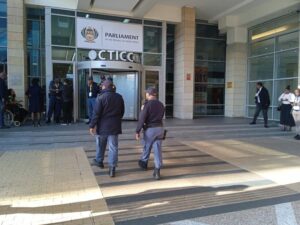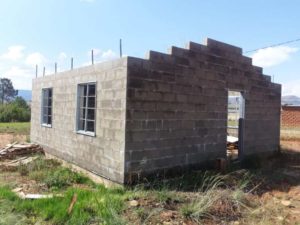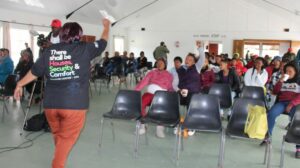Hundreds of angry climate activists marched to Parliament to demand “system change” in Cape Town on Saturday. They held up placards bearing the words: “Green energy for green future,” “Solution, not pollution” and “End the use of fossil fuels” as they marched and sang struggle songs.
Sarah Farrell, general manager of African Climate Alliance, said activists were “marching for system change” in order to force Parliament to resolve social, climate and economic crises that the country faces. “People don’t have access to clean water, housing and food. The public transport system is failing, which affects the people’s ability to move around to make money and get jobs. Lack of public transport infrastructure means people have to take more expensive and more carbon-intensive transport.”
“We want Parliament to create a permanent joint standing committee to address the climate and ecological crises,” she said, adding that Parliament must not treat social and economic issues as isolated and separate from ecological ones but rather as interconnected.
Gabriel Klaasen, spokesperson for Project 90 By 2030, said: “We call for an end to all fossil fuel investment like coal and gas to ensure that our future is secure.” Project 90 by 2030 is calling for Parliament to change South Africa’s education system: “The new education system must educate our young people about environmental and social injustice so they can tackle them. We want change now.”
Climate activist, Kutlwano Nondabula said he feels the effects of the current ways of generating as a resident in Khayelitsha. “During heavy rains, rain water comes into our shacks and floods roads. Flooding is the result of climate change, which is caused by the current ways of generating power,” he said.
Nondabula said he wants Parliament to introduce environmentally friendly means of generating electricity such as solar and wind power. “We are experiencing a lack of electricity while there are friendly, alternative ways of generating power. We want the government to help us use these alternative means in the township,” he said.
Three of sixteen sections at the Driftsands Nature Reserve were completely waterlogged after heavy rainfall. Archive Photo: Siphokazi Mnyobe/GroundUp
Athabile Mvumvu, a school-going climate activist, said the government must do something about air pollution in Khayelitsha: “It’s not OK to breathe air that is not clean the entire day in Khayelitsha. I call upon my leaders to take action.”
Climate activist, Zipho Majova said: “For too long the rights and well-being of people have been sidelined for the purpose of creating wealth for a few.” The sidelining of these rights has led to an “interlinking crisis” of income inequality, water and food insecurity. “We need energy, water, housing and food access for all now!” she said.
The memorandum demands the “urgent establishment of a permanent Parliamentary Joint Standing Committee on the Climate and Ecological Crisis that meets once per quarter.” It calls for Parliament to “table a motion to consider and debate the adoption of the Climate Justice Charter which aims to “end hunger, thirst, pollution and climate harms.”
Also, it calls for “transformation of the Department of Mineral Resources and Energy which currently acts as the biggest stumbling block to a just transition in the country.”
Babalwa Ngamlana, deputy director in the president’s office, received the memorandum on behalf of President Cyril Ramaphosa. She said the presidency would respond to the memorandum in 6 to 8 weeks time. Councillor Traverse Le Goff received the memorandum on behalf of Cape Town’s mayor, Geordin Hill-Lewis.





